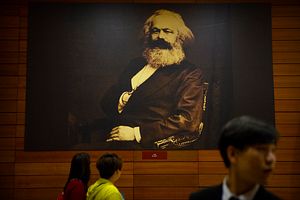One of the paradoxes of modern Chinese history is that, during the most xenophobic and anti-foreign period in the country’s modern history, in the depths of the Cultural Revolution half a century ago, the words of German émigré Karl Marx and the ideology that bore his name imported from that maligned, distrusted, and hated outside world were untouchable parts of the dogma.
Nien Cheng in her celebrated memoir of the era, Life and Death in Shanghai, put her finger on this paradox. Responding to her interrogators when attacked for working for a foreign company in Shanghai, she asked, why was that such a problem? The Communists, after all, she said, were serving a set of ideas born abroad, created by a foreigner. She could have gone further. The Red Guards were idolizing a foreigner whose vast corpus of work, when it mentioned China (which was rarely), did so with lofty disparagement and disdain. The country, Marx thought, was decades, if not centuries away from the revolutions he predicted were about to topple governments in Europe and the West.
Despite this, while the 200th anniversary of Marx’s birth in early May was marked with small scale events in his home continent, attended by respectful, but modest crowds, it was only in China that the celebrations had any sense of import. Marx still holds sway in the People’s Republic. Speaking on May 4, in the Great Hall of the People, Xi Jinping called Marx “the greatest thinker of modern times,” a man whose insights and ideas still shine “a light of brilliant truth.”
These days everyone outside of China is wracking their brains about how to have influence and impact in the country and find ways of appealing to its leaders. But foreigners are mostly stonewalled by Chinese leaders’ fervent commitment to ideas that must either be demonstrably indigenous, or be clearly in accordance with “Chinese characteristics.” It is a great paradox therefore that a philosopher who lived almost in poverty and resided on the margins of Victorian society seems to be the only foreign thinker who cracked the mystery of how to have decisive impact on the politics of China. That he evidently did this unwittingly, and posthumously, only exacerbates things for all the others who have tried, and failed. Everyone has to live with the inconvenient truth that Marxism succeeded where full market capitalism, democracy, and a host of other ideas the West promoted to Chinese over the last century mostly failed – or at least, did not turn out quite as those promoting them expected.
So what exactly did Marx give the Chinese so that they still accord him such high status? Class struggle is largely just rhetoric, even for elite leaders these days in Beijing. Dialectic materialism, social alienation, and ideas about constructing the superstructure are left to the geeks in the Party Schools, active adherents of a faith the rest of society has largely forgotten. But Marx still matters enough for Xi to unashamedly talk of him in the awestruck way he did on May 4, even as everything else he says is about the Chinese renaissance, the Chinese dream and China dealing with the world on China’s terms and through promotion of its own indigenous traditional culture, with Confucius at the forefront.
Marx has this lofty position in China thanks to the one immense insight he gave Chinese leaders and activists, intellectuals, and writers after the introduction of his ideas in the early 20th century. His theory, as Xi put it, “illuminated the path of humanity’s exploration of the law of history and humanity’s search for their own liberation.” It did this specifically by giving a new way of viewing history, one which was not circular, trapped, and perpetually returning to the points of implosion and breakdown which had dominated Chinese philosophies of the past. The massively influential words that started off the great Ming epic, “Romance of the Three Kingdoms,” from the 15th century typify this circular view, with their haunting declaration that the empire united will then become disunited, and disunited awhile will revert to unity once more.
Chinese leaders today subscribe above all to the Marxist vision of a purposeful, ever-forward-moving, scientifically progressive history, one where the future is always better than the past. Deng Xiaoping said that as a Communist, he was an optimist. This was the source of his optimism. No matter what, the laws of history as outlined by Marx meant that things would work out. It is not surprising that Chinese leaders from his generation found this idea so powerful. They had seen so much suffering and conflict. All of this had to end somewhere good, because otherwise what was the meaning of it?
Xi inherits this worldview. Indeed, with the centenary goals, he sees a major part of it about to come to fruition. Things finally are coming right. The teleological view of history is being proved correct. And Marx with his dynamic, dialectic view of the past was the great proponent of that, translating it from the abstractions offered by Hegel into the real world of politics and action. The vision of purposeful historic development was a massively useful tool for Chinese leaders, freeing them from any commitment to a fatalist eternal recurrence, one in which they and their country were imprisoned in repeated patterns of events that they had no power over, perpetually moving in great circles of chaos and then unity, and into chaos again.
That at least explains why, for today, Marx is still important in China. The dream may well be a China one – but the route to reach that will only be through the kind of positive path Marx’s vision of history predicts. That above all is why Chinese leaders still hope, and have faith, that the German émigré philosopher’s work, whatever the rest of the world thinks, will turn out right.

































